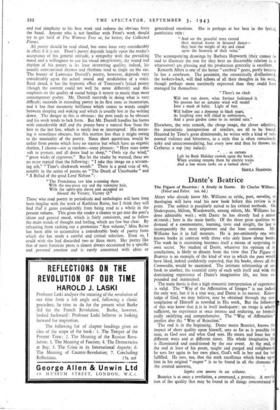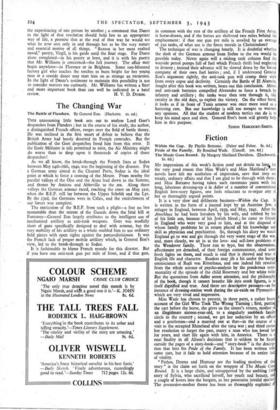Dante's Beatrice
MANY who already know Mr. Williams as critic, poet, novelist, or theologian will have read his new book before this review is in print. The subject is peculiarly suited to his critical methods. On Shakespeare, Milton, Wordsworth, among others, Mr. Williams has done adthirable work ; with Dante he has already had a minor skirmish' 'here is the main battle. Of the three great qualities we demand of a commentator, learning, taste and insight, the last is incomparably the most' important and the least common. Mr. Williams has it in full measure. He is pre-eminently one - who knows books in Contrast with those who only know about books. The work ,he is examining becomes itself a means of surprising its own secret. No 'student' of Dante, whatever his, opinion of its conclusions, is likely to dissent from the view that The Figure of Beatrice is an example of the kind of way in which the poet would have liked, indeed confidently expected, that his books, above all the Commedia, would be examined. The intimate relationship of one book to another, the essential unity of each with itself and with the dominating experience of Dante's imaginative life, are here ex- pounded and maintained.
The main thesis is that a high romantic interpretation of experience is valid. The " Way of the Affirmation of Images" is not indeed the only way, but it is a true way, and Dante is its master. Know- ledge of God, we may believe, may be obtained through the con- templation of Himself as revealed in His work, But the followers of this way know that it is in itself inadequate: no image is wholly sufficient, no experience at once intense and enduring, no formula really satisfying and comprehensive. The " Way of Affirmation" implies also the " Way of Rejection."
The end is in the beginning. Dante meets Beatrice, knows the impact of sheer quality upon himself, sees as far as is possible for man, as God sees and what God sees. He meets and loses her in different ways and at different times. His whole imaginative life is illuminated and conditioned by the one event. At the end, at the end at least of his poem, taught and purged and enlightened. he sees her again in her own place, God's will in her and for her fulfilled. He sees, too, that the stark excellence which broke upon him in his original " stupor" is to be found in all the elements of the created universe,
' legato con amore in un volume.
Beatrice is at once a revelation, a command, a promise. A revela tion of the quality that may be found in all things concentrated in the experiencing of one person by another ; a command that Dante in the light of that revelation should hold fast to an appropriate way of life, a promise that at the end of that way he would see what he now sees only in and through her to be the very nature and essential motive of all things. " Reason in her most exalted mood," poetry, Virgil, is his guide until the final stage. For Dante alone completed—in his poetry at least, and it is with his poetry that Mt. Williams is concerned—the full journey. The affair may begin anywhere—in Florence or in Brighton. Some sun-blistered factory girl who teaches the torches to burn bright for her young man at a seaside dance may start him on as strange an excursion. In the light of Dante's testimony to maintain this possibility is not to consider matters too curiously. Mr. Williams has written a finer and more important book than can well be indicated in a brief



























 Previous page
Previous page